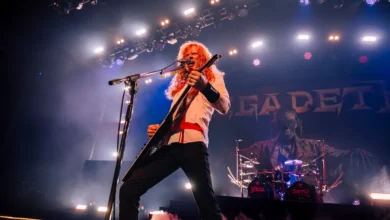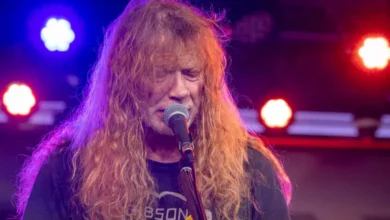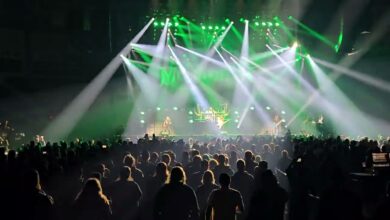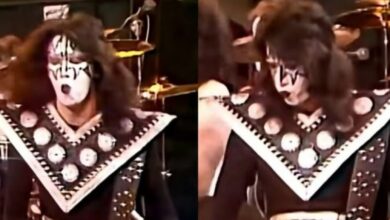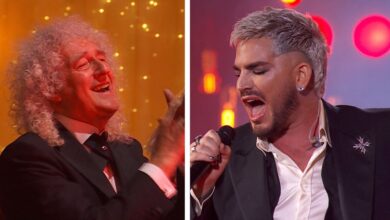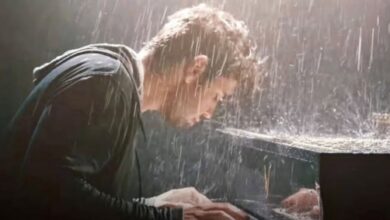KISS – “Parasite” Live at Winterland 1975: The Night Ace Frehley’s Riff Set the World on Fire
The Winterland Ballroom in San Francisco had a way of turning concerts into folklore, and on January 31, 1975, KISS showed up determined to add their own chapter. The Bill Graham–run venue was a crucible for bands on the brink, and KISS—then in the white-heat phase between their scrappy club years and arena ascendance—treated the gig like a televised title fight. The lights hit chrome, the makeup caught fire in camera lenses, and the room tightened around four silhouettes who seemed bigger than the proscenium could hold. Fans didn’t just watch; they leaned in, as if a spark might jump from stage to balcony.
Context matters with KISS, and Winterland 1975 arrived just months after the release of Hotter Than Hell. The band was still converting curiosity into conviction—transforming skeptics into believers with volume, velocity, and drill-team precision. What unfolded that night felt like a thesis defense for the early catalog: a run of songs built for combustion, performed with the kind of commitment that turns a room into a rumor mill. Long before a live album would canonize their stagecraft, Winterland offered an uncrowded look at how they did it—tight, theatrical, and ravenous to prove the point.
The setlist, as reconstructed by archivists and sharpened by circulating footage, captured the band at full sprint. You can trace the route song by song: the early one-two punches, the smoke, the pacing, and the escalation toward epics that gave each member a lane to sprint. Crucially, the running order included “Parasite,” slotted like a steel I-beam inside the show’s frame. Fans who know only the studio cut learn something essential here: live, the song doesn’t ride on nostalgia; it attacks—leaner, faster, and somehow heavier, as if the riff had simply been waiting for a bigger room to breathe in.
“Parasite” is Ace Frehley’s song, stamped with his writer’s fingerprint even if Gene Simmons handled the original studio vocal. It arrived on Hotter Than Hell in 1974, one of the record’s fiercest tracks—blue-collar and mean, a chainsaw riff coolly pretending to be a hook. Critics later called it proto-metal, even proto-punk: the sort of tune that smelled like warm tubes and street grit. In San Francisco, the live version preserves that grime but adds altitude; it climbs faster and hits harder, as if the room itself were a fifth instrument pushing the band forward.
What stands out in the Winterland rendition is the pocket—a relentless forward lean that pulls the groove taut without strangling it. Peter Criss drives like a cabbie finding green lights in succession; Simmons bolts a heavy, sine-wave bass to the floor; Stanley slashes rhythm on the off-beats like he’s carving air; and Ace floats above with a tone that feels both molten and articulate. It’s the simplest compliment you can give a band: they sound like a unit. “Parasite,” in that context, becomes less a song than an instruction—“follow us, and don’t look down.”
Ace’s guitar work is the performance’s north star. He wasn’t a shredder in the 1980s sense; he was a stylist, a melody engineer who understood that a six-note phrase played with the right vibrato can make a balcony lean. At Winterland he threads those phrases through “Parasite” with a boxer’s economy—jab, slip, grin, repeat—snapping bends that hang just long enough to tease the next hit. If you’re measuring influence instead of BPM, this is the kind of playing that plants flags in a thousand future bedrooms. It’s not about speed; it’s about swagger and inevitability.
The cameras help tell the story. Even on the surviving reels—some upscaled, some color-corrected—you see a masterclass in stagecraft. KISS had already learned how to choreograph chaos, turning every cue into a photograph waiting to happen: Gene’s bass held like a warhammer; Paul’s mic-stand geometry; Ace’s tilt toward the fretboard, cigarette-cool; Peter’s shoulders squaring the kit. These aren’t accidents; they’re a language. Winterland didn’t just capture a show; it captured the band teaching us how to watch them.
The room itself was part of the instrument. Winterland’s wood and height gave percussion an elastic rebound, made guitars bloom, and let vocals cut with a faint halo—small sonic favors that live recordings still struggle to counterfeit. When “Parasite” hits its stride, you can hear the venue answer back: the slap of snare in the rafters, the guitar’s upper mids finding reflective surfaces, the crowd’s cheer compressing into a single warm hiss between phrases. It’s a chemistry set of acoustics and attitude.
Because the night was filmed, the performance kept living long after the last stomp rattled the floorboards. Fans passed tapes, traded upgrades, and, in the streaming era, resurfaced clips so pristine you can count the reflections in a tuner knob. What survives isn’t just ephemera—it’s a moving document of a band inventing its own gravity. And every few years, when a cleaner cut appears, new listeners arrive at the same conclusion the room reached in ’75: songs like “Parasite” aren’t deep cuts; they’re cornerstones.
There’s a narrative thread, too, in how “Parasite” traveled through KISS history. It roared on the Hotter Than Hell tour, then left the stage for a time, only to reappear decades later with even more bite. That arc underscores the song’s dual identity: era-defining and evergreen. Watching the Winterland footage, you sense why the band could put it down and pick it up again without a creak. The riff is a machine built to run; the performance is gasoline.
A word about the crowd: they look like the first generation of true believers. Some are there for the spectacle, faces lit by flash pots; others for the thump, bodies leaning into the downbeat; a few simply for the risk of being near something volatile. When “Parasite” locks, the camera catches a particular expression—half grin, half wince—that only happens when a band is playing at the edge of control. It’s the sound of a city that expects to be impressed and a band eager to oblige.
What KISS achieved at Winterland was more than volume. It was choreography of momentum—how to build a set that rises like a skyline and then points you to a single window. “Parasite” is that window. The band doesn’t just perform it; they inhabit it, each part clicking into place like steel on a bridge. That sense of fit—of inevitability—turns the song into a memory even if you’ve never been in the room.
Revisiting the clip now, after Ace Frehley’s death at 74, is both exhilarating and tender. You watch his hands—steady, playful, certain—and hear a tone that still sounds like a streetlight switching on. The obituaries capture the headlines; this footage captures the reason for them. Here is Ace at the height of his kinetic wit, the writer whose riff became a rallying cry, the player whose bends could make a crowd breathe in unison. It’s not nostalgia; it’s evidence.
Ace’s passing reframes Winterland as a keepsake. The camera’s tight frames on his fretboard feel like postcards from a city you meant to visit more often. You notice details—the left-hand shake at the end of a sustained note, the way he sets up a phrase by stepping into the mic’s shadow—that you missed before. Grief can sharpen focus; here, it also brightens gratitude. We didn’t just lose a guitarist; we lost a stylist who taught songs how to walk with a certain tilt.
If you need a single clip to explain why “Parasite” still gets name-checked by critics and musicians half a century later, Winterland is the answer key. It’s heavy without bloat, fast without hurry, catchy without concession. It sounds like a band that has already written its future on a dressing-room mirror and is now busy underlining it in permanent marker. Legends aren’t born fully formed; they’re hammered into shape by nights like this, in rooms that remember how to listen.
In the end, what makes the performance special isn’t just the heat or the history; it’s the sense of arrival. KISS stepped into Winterland as contenders and left as inevitabilities. “Parasite” was their tell—proof that a song can be both a weapon and a welcome. Watch it once for the riffs; watch it twice for the staging; watch it a third time to catch Ace smiling to himself after a line lands exactly where he wanted it. That’s the sound of a band—and a guitarist—knowing they’ve just pinned their flag to the map.
And so the tape rolls on, upgraded and re-uploaded, a river of firelight and chromed chords flowing from a winter night in 1975 to screens everywhere. The music is the message: this is how it felt when four New Yorkers burned their names into the rafters. With Ace gone, that message lands with the weight of a final chord, ringing into the dark a beat longer than expected—long enough to nod, to smile, and to hit play again.
